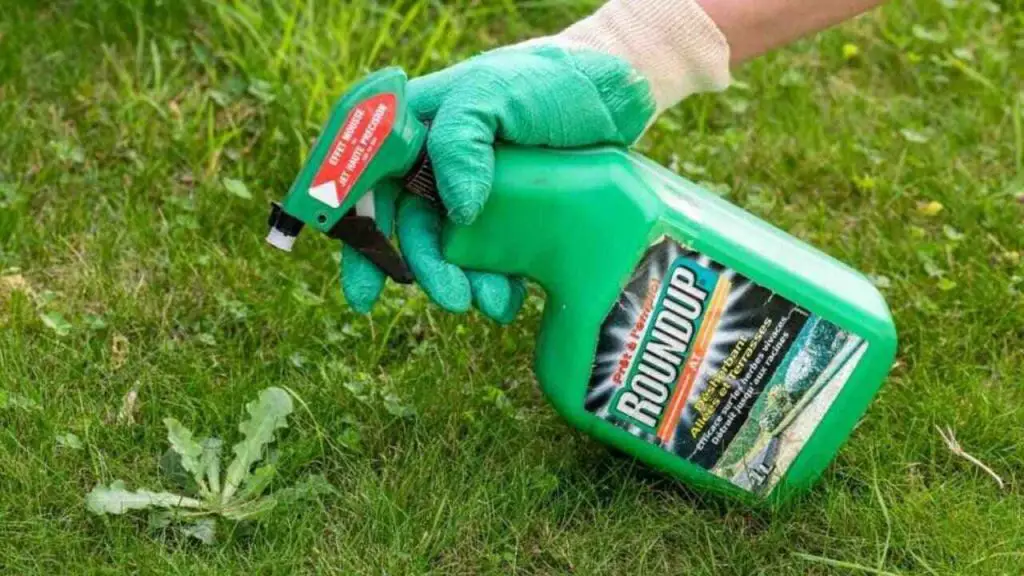Are you curious about how long does Roundup stay in the soil? If so, you’re not alone. Many people are interested in this topic, and for good reason! Roundup is a popular weed killer, and knowing how long it lingers in the soil can help you make informed decisions about its use.
In this blog post, we’ll take a look at what research has to say about Roundup’s longevity in the dirt. Stay tuned for more information!
What Is Roundup And How Does It Work?

Roundup is a weed killer that was created by Monsanto in 1974. It’s made with the chemical glyphosate, which kills weeds by inhibiting their ability to produce proteins.
Roundup is used in agriculture, forestry, landscape maintenance, and residential gardening. When used as directed, it’s safe for humans and animals. However, Roundup has been linked to cancer, so it’s important to use it with caution.
Roundup works by coming into contact with the leaves of plants. The glyphosate then enters the plant’s vascular system and inhibits the production of proteins. This interferes with the plant’s ability to grow, and eventually kills it.
Roundup is most effective on young plants that are actively growing. It’s less effective on older plants because they have thicker cuticles that protect them from the chemicals. Roundup is rainproof within an hour, so it won’t wash away before it has a chance to work.
How Long Does Roundup Stay In The Soil?
Roundup is a popular herbicide that is often used in gardens and farms. The active ingredient in Roundup is glyphosate, which is designed to kill plants. However, glyphosate can also stay in the soil for many months after application.
This can be a problem for farmers who want to rotate crops, as it can prevent new plants from taking root. It can also be harmful to animals that graze on glyphosate-treated areas. As a result, it is important to know how long Roundup stays in the soil.
Roundup breaks down relatively slowly in soil. Studies have shown that glyphosate can remain active in the soil for up to six months. However, the exact length of time depends on several factors, including the type of soil, temperature, and rainfall.
In general, Roundup will stay active for longer in cooler, wetter conditions. Therefore, farmers should be cautious when using Roundup near streams or lakes, as the herbicide could potentially contaminate the water supply.
While Roundup does stay in the soil for some time after application, it is not permanent. Glyphosate will eventually break down into carbon dioxide and water, and will no longer pose a risk to plants or animals. However, this process can take several months, so farmers need to be aware of the potential risks before using Roundup on their crops.
What Are The Health Risks Associated With Roundup?
Glyphosate is considered to be relatively safe for humans and animals. However, there are some health risks associated with exposure to Roundup. The most common side effect of glyphosate exposure is skin irritation. This can occur if the herbicide comes into contact with your skin or if you inhale it. Inhalation of Roundup can also cause headaches, dizziness, nausea, and vomiting.
More serious health effects can occur with prolonged or repeated exposure to Roundup. These effects include damage to kidney and liver function, reproductive problems, and cancer. Some of these health effects are only seen in animal studies, so more research is needed to determine if they also occur in humans.
Overall, Roundup is a safe herbicide when used as directed. However, there are some health risks associated with exposure to the herbicide, so it is important to take precautions to avoid contact with it.
Can Roundup Be Used Safely On Gardens And Lawns?
Roundup is a herbicide that is used to kill weeds. It can be purchased at most hardware stores and is sometimes used by professional landscapers. Roundup is effective at killing weeds, but it is also highly toxic to humans and animals.
For this reason, it is important to use Roundup only as directed and to take precautions when using it in your garden or lawn. When used properly, Roundup can be an effective tool for weed control.
However, you should always follow the manufacturer’s instructions carefully and take steps to protect yourself from exposure. If you have questions about whether or not Roundup is safe for your garden or lawn, you should consult with a professional landscaper or gardener.
Are There Any Natural Alternatives To Roundup?
While Roundup is effective at killing weeds, it has been shown to cause health problems in humans and animals. Studies have linked glyphosate exposure to cancer, birth defects, and endocrine disruption. As a result, many people are looking for natural alternatives to Roundup.
There are several natural alternatives to Roundup that gardeners and farmers can use to kill weeds.
One popular alternative is vinegar. Vinegar is acetic acid, which is a naturally occurring substance. Vinegar can be used as an herbicide on its own or diluted with water. When diluted with water, vinegar can be just as effective at killing weeds as Roundup.
Another popular weed-killing alternative is salt. A salt solution can be made by dissolving one pound of salt in two gallons of water. The salt solution works by causing dehydration in plants, which eventually kills them.
There are also several commercial weed killers available that are made with natural ingredients. These products are typically more expensive than Roundup, but they may be worth the investment for those concerned about glyphosate exposure.
Tips To Keep Your Soil Healthy With Roundup
Gardeners know that healthy soil is essential for healthy plants. However, maintaining healthy soil can be a challenge, especially in areas with high clay content or poor drainage.
Thankfully, Roundup products can help. It penetrates the soil to kill weeds and grasses, making it easier for gardeners to till and plant. Roundup also breaks up compacted soil, allowing roots to penetrate more easily. In addition, it helps to improve drainage and aeration while preventing erosion.
As a result, Roundup products can be an important part of any gardener’s toolkit, helping to create and maintain healthy soil conditions.
Additional Contents



